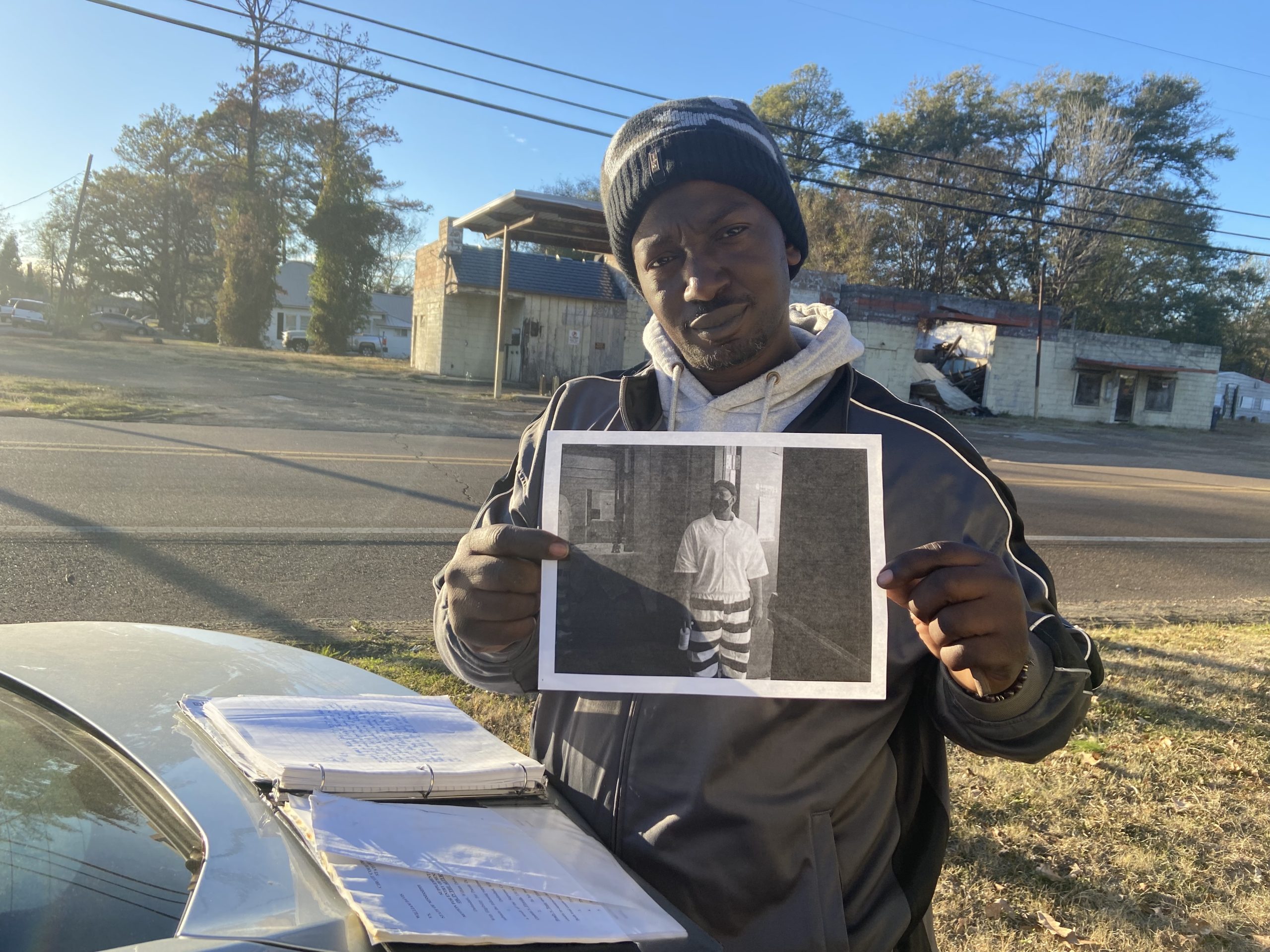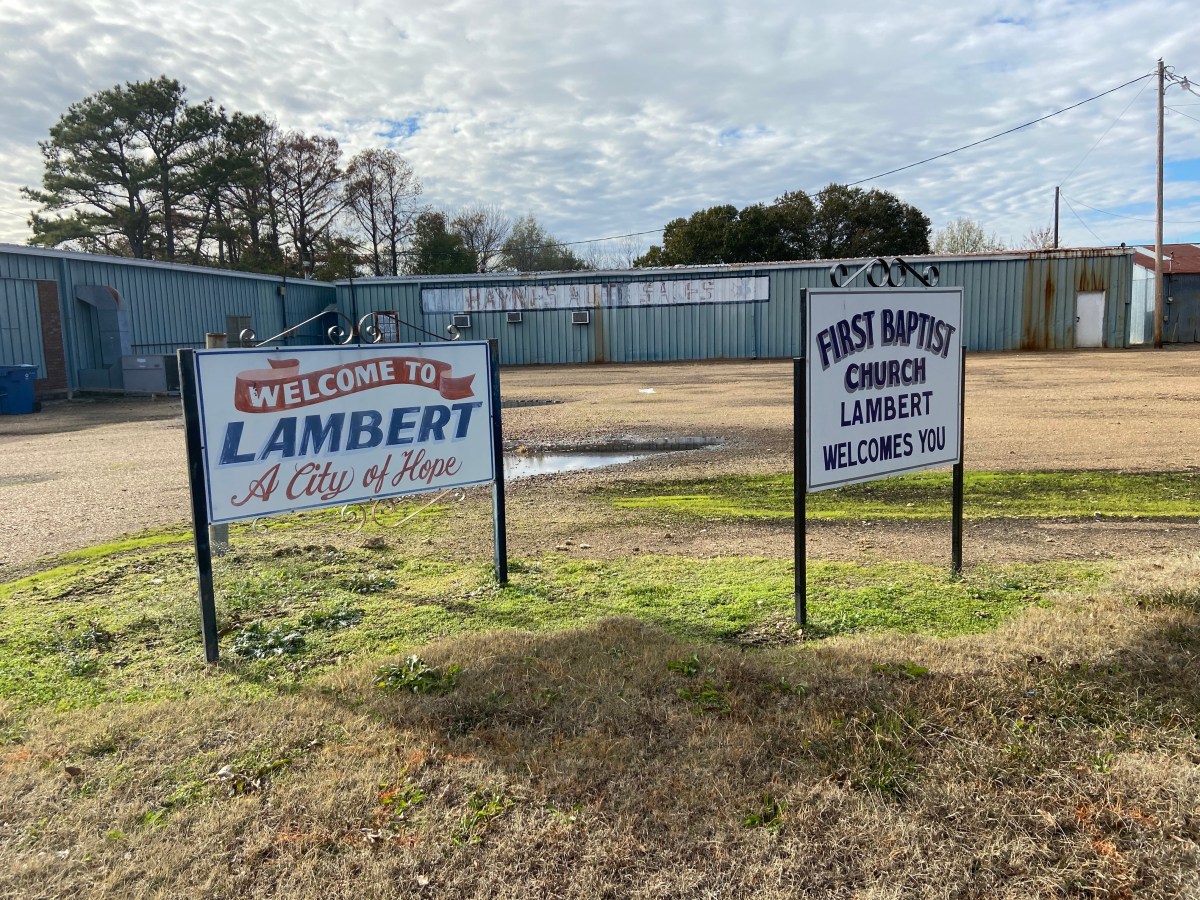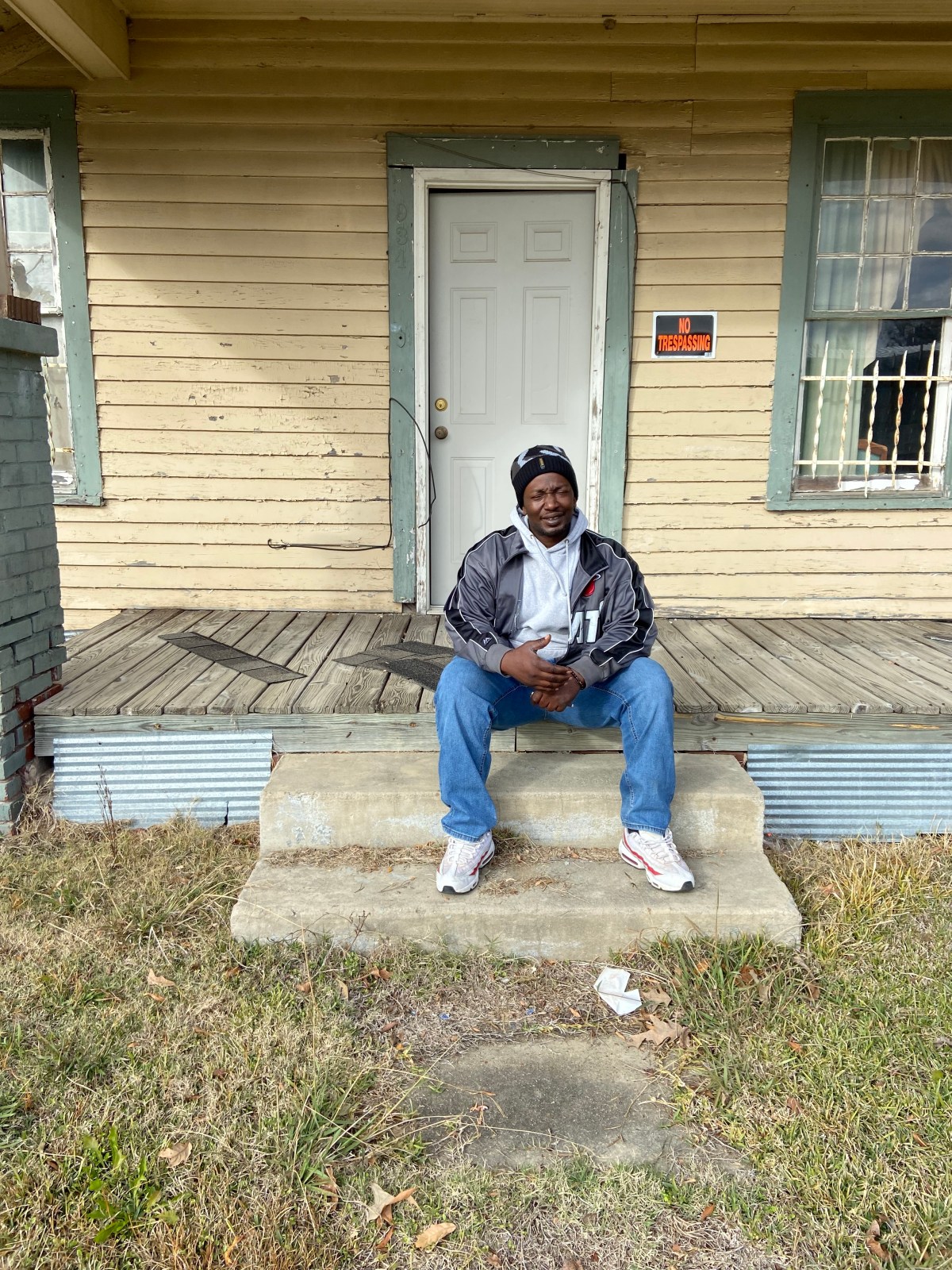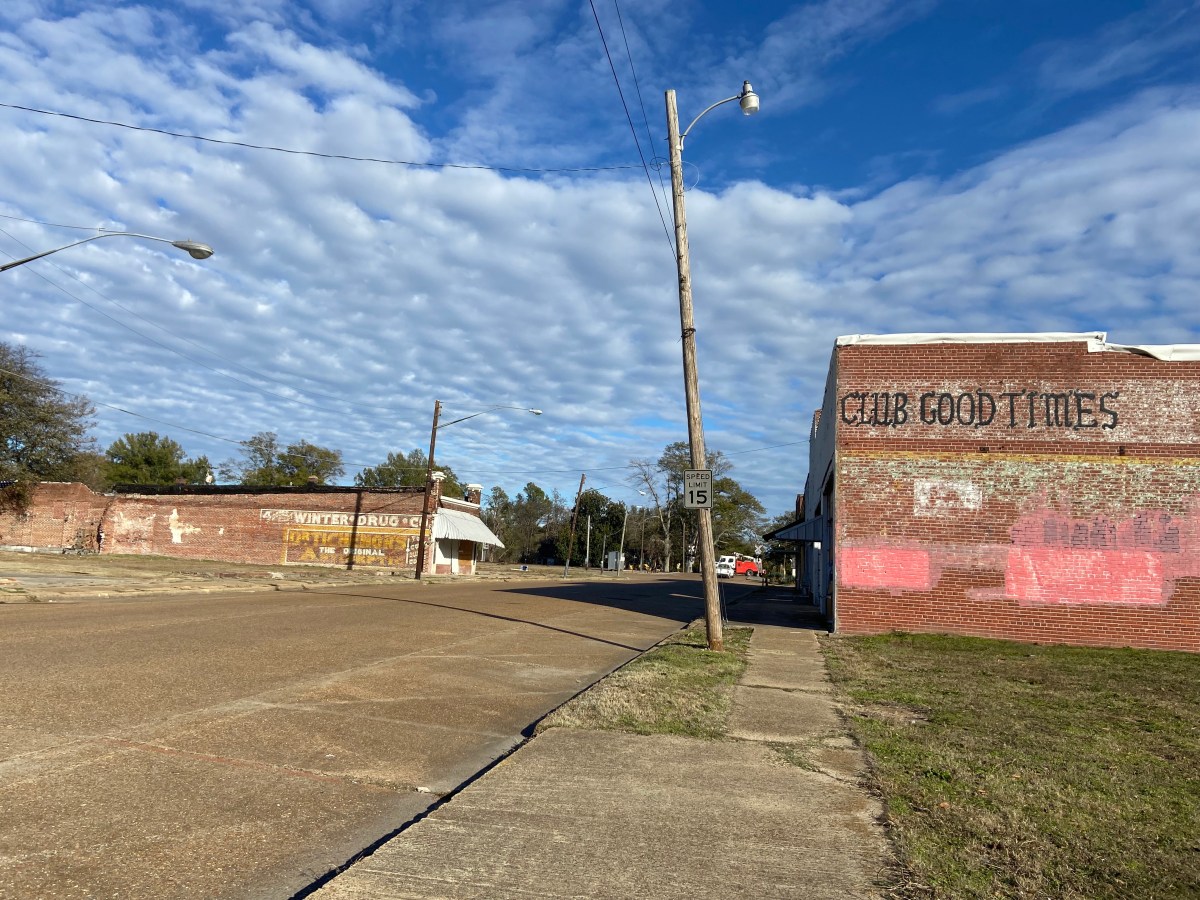Mississippi Today
At 17, William Davis was convicted of a murder he did not commit. His conviction was not wrongful. But is the legal doctrine behind it just?

At 17, William Davis was convicted of a murder he did not commit. His conviction was not wrongful. But is the legal doctrine behind it just?
The murder of Billy Dover spread quickly through Quitman County, a rural stretch situated in the northwest Mississippi Delta, where most of the residents are Black and earning below the poverty line.
As the afternoon of July 3, 1998, wore on, the news of what happened at the Western Auto Store traveled four miles up Highway 3 from Lambert, where it was located, to Marks, where William Davis, then 17, was waiting in line to buy a drink at Fred’s Dollar Store. William and his best friend, 19-year-old Andre Smith, had stopped on their way to Batesville to get a Band-Aid for Andre’s bleeding hand.
“Have you heard? Someone went and killed Billy Dover,” the woman behind the cash register said as she rang up their items.
Bells went off in William’s head. Andre turned to look at William, but no one said anything. Killed him? William had not heard that. This is crazy, he thought to himself. I didn’t expect for none of this to happen.
At age 13, William had moved from the farmland of Vance, Mississippi, to the small town of Lambert, after his dad, a tractor driver, had died suddenly of cardiac arrest. The highway sign welcoming people into Lambert boasts the slogan: “A City of Hope.”
William’s mom worked night shifts at a nursing home to support her six children, and William, the youngest, was often left home alone. His first year living in Lambert, William watched the streets from his porch: Kids were smoking and selling weed up the block; older men were smoking crack behind his house. After school, he would sit from 3-10 p.m. on the porch of his yellow and green craftsman-style house at the corner of Darby Avenue — Lambert’s main road — and the highway, and watch the streets. At 14 years old, he joined them. An older neighborhood kid handed William an ounce of weed and demanded he return with money. William started selling weed, then crack, which provided easier and faster cash.
Andre, a neighbor from Vance, moved up to Lambert, too. He was two years older, part of a gang, and known for getting into fights. William’s mom asked him to stop hanging out with Andre. Instead, in ninth grade, William stopped going to school. Every day, he would meet up with Andre to smoke weed, sell crack, and gamble. Often, they would gather outside the Western Auto Store, which was at the center of town.
When William had met up with Andre outside the Western Auto Store on July 3, 1998, he was mad. They wanted to go shopping for the Fourth of July in Batesville, but last night, Andre lost the money William had lent him in a game of dice.
The Western Auto Store was a neighborhood institution, as was Billy Dover, the white 65-year-old man who owned and ran it. Customers would come into the store to buy materials for their bike or car or household appliances, to sit in recliners and watch TV with Dover or even to borrow some money, which he was generous about lending. William and his family, like most people in the area, knew Dover well. Dover had a large family of 11 sons and daughters, including stepchildren, and acted like a father figure to the town. The Davis family would go to Dover’s store even when they lived in Vance. Dover put the training wheels on William’s first bike.
Standing outside the store on July 3, 1998, arguing with William about money, Andre came up with a plan.
“He told me he had an idea of how to get him some money. I’m like, ‘Go ahead. I’m going to go along with it,’’’ William said.
Andre had a plan to steal from Dover. Andre ended up killing him.
Eight years after the murder of Billy Dover, and eight years after being picked up by the police, William Davis sat in his Unit 32 cell of the Mississippi State Penitentiary and began to write down the details of his case. It was 2006; he was now 25 years old, but he still didn’t understand how he had ended up here.
Unit 32 was a notorious lockdown facility in the state — inmates let out of their cells for only one hour per day — and had made state headlines for its inhumane conditions, outbreaks of violence, and reports of inmate deaths. William had witnessed a friend get stabbed. Two men attacked William with a weapon, and he received a disciplinary charge, later expunged from his record, for fighting back in self-defense. A lawsuit put forth by the American Civil Liberties Union shut down the unit in 2010, but in 2020 reports surfaced of inmates being housed there again.
A ward in Unit 32, Timothy Morris watched as William’s mom cried to him during a visit. Timothy approached William after and asked him: “What are you going to do to make your mom proud? She’s cried enough with you being in this place.”
William went back to his cell and started to write, thinking that maybe if he understood why he was in here, he could find his way out of here. He had 21 bullet points detailing what he remembered happened between the morning of the crime and the day of his arrest. Titling the section, “Specific Facts Not Within Petitioner’s Personal Knowledge,” William wrote down what he didn’t understand. How was he convicted of capital murder if he never killed anyone?
In the unit, away from the violence, there was a group of guys “practicing litigation,” as William puts it. They were ordering books from the law library, comparing their cases, and filing post-conviction appeals. Many of the guys in the legal circle at the prison were also fighting murder cases, so they poured over legal scholarship together, trying to break down their cases and to help each other write their own motions.William started sitting with them and learning about the law. At night, he would leave order slips under his cell for new books and cases from the law library. The next day, copies would show up at his door, and he would consult his legal dictionary to understand the terminology.
“I didn’t understand until I started doing research on cases, filing paperwork, and studying law,” he said. That’s when William learned about the felony murder rule, and how it was operating in Mississippi. “That’s when I started to understand.”
Under the felony murder rule, if someone is killed during the commission of a felony, those who participated, even tangentially, are able to be charged with murder, without planning, intending, or committing it.

Standing outside the Western Auto Store on the morning of July 3, 1998, Andre gave William instructions: Enter the store and purchase a hose for a washing machine. Once inside, William watched as Dover cut the hose for him and confirmed it was the right one. William brought the hose back out to Andre.
Later, District Attorney Laurence Mellen would say that this was how “the defendants made preparation for the crime,” a document from the Quitman County Circuit Court reads, “by having entered the store, making themselves aware of whether the victim Mr. Dover was alone.”
Andre went inside the store under the pretense of returning the hose. Dover said that once it was cut, the hose couldn’t be exchanged. Andre argued. “It escalated from there,” William said. “I don’t know if that was the actual reason for what transpired. But I do know that when that happened, I left.”
In court, Mellen detailed what he asserts happened inside: “Davis went to the cash register, tried to get in, while Lushun, Andre Lushun Smith, had taken Mr. Dover to the back of the building on the pretense of buying something back there, assaulted him there in the back, and beat him the back of the store. The State would prove that Davis left a fingerprint on the cash register in the front while the assault was being made in the back. Smith assaulted Mr. Dover with a bicycle pump and repeatedly beat on him,” Mellen said. “They did take the wallet from Mr. Dover, Mr. Billy Dover, which had money in it.”
Dover survived for a few minutes after Andre’s beating, court documents report, but was discovered dead by Dover’s son on the floor of his store.
Davis said that when he heard Andre and Billy Dover fighting, he left. The next time William saw Andre, he had blood on his shirt. He thought to himself: “Ah, man, let me get away from this. Let me get away from this.”
Andre handed him cash. He asked Andre to change his clothes, but he didn’t ask Andre what happened. Hours later, when the woman behind the cash register at Fred’s Dollar Store confirmed to William that Dover had indeed been murdered, he was just as shocked as her. “I didn’t think he would go that far. I never thought it would get to that point,” he said.
After Andre was picked up by the police and taken into questioning, the Smith family came to William’s house and demanded to know what they did. William replied with the line he would later start using on everyone: “I can’t speak on what he did or didn’t do. If I leave a place, if I remove myself from a situation, how can I know what’s going on there?”
When the police came and took William into questioning, he tried to get them to understand that he wasn’t present during the murder. If he never even saw the murder, how could he have done it? “I hadn’t done anything. I didn’t do this. I didn’t murder anyone. That was my whole thing, I was trying to convey to them that I murdered no one,” he said.
But what William himself didn’t understand at the time was that, under the felony murder rule, it didn’t matter if he had killed anyone or not.
“To be honest, the trouble with felony murder is because there is such a wide range of culpability, that allows you to go to jail forever,” said Walter Boone, a Clarksdale lawyer who later worked with William on his case. “Were you just the pick-up driver, or did you go in? Did you participate in the robbery? Did you know about the murder in advance and plan it and participate in it? The felony murder does not distinguish between the levels of culpability on that.”
The felony murder rule is enacted in 44 states across the country, with charges and sentences at varying levels of severity. Recent legal reform in California has limited felony murder to the death of an on-duty police officer, the direct killing of someone, or intentional aiding and abetting of a murder. In some states, like Colorado, felony murder is considered second-degree murder, reducing the penalty and sentencing time. But in Mississippi, felony murder falls under the capital murder statute. Those convicted of capital murder are either sentenced to death, life without parole, or life with parole—but only if the crime was committed before July 1, 1994.
In Mississippi, “Capital murders are disproportionately felony murders,” State Public Defender André de Gruy explains. A review of available data, provided by the internal system in the Mississippi Administrative Office of Courts, reveals there have been 301 capital murder sentences given across the state between Jan. 1, 1994, and Sept. 23, 2022. Of those capital murder sentences, 226 were for felony murder cases.
For the state to convict someone of capital murder, de Gruy said, “they don’t have to prove the murder, they only have to prove the underlying felony, or the intent to do the underlying felony. They don’t have to prove an intent to kill.”
“The felony murder rule in Mississippi is very broad. They still allow a non-triggerman to get the death sentence,” de Gruy said.
As a result, individuals at the very periphery of a killing are being trapped with the same charges, and potential sentences, as the murderers themselves.
De Gruy pointed to a 1989 case as an example. A 15-year-old, Vincent Harris, sat on the handlebars of his co-defendant’s bike as they rode to a convenience store. Before they arrived, Harris jumped off the bike and waited by the side of the road, as his co-defendant, Ron Foster, continued to the market. Foster attempted to take money from the cash register and ended up shooting the clerk, but Harris, who was miles away at the time, was still charged initially with capital murder.
Champions of the felony murder rule often refer to the deterrence theory as support, legal scholar Kat Albrecht stated in her paper “Data Transparency, Compounding Bias, and the Felony Murder Rule.” When examining a case in Illinois, she wrote that the state’s attorney argued that the “felony murder rule deters felony commission because offenders know that if something goes wrong, and someone dies, they will be charged with murder regardless of their intent or who actually pulled the proverbial trigger.” This, in theory, should lead to less crime, but in practice falls apart as offenders, especially juveniles, often aren’t aware of the technicalities of the law — or thinking in such terms when committing crimes that they do not believe will involve a death.
“Well-established brain development science shows that children and teenagers are less able to perceive risk or anticipate consequences than adults,” said Jody Kent Levy of the Campaign for the Fair Sentencing of Youth, according to a report by the Restore Justice advocacy group.
In his work, de Gruy said he has seen some patterns connecting felony murder cases and juvenile cases anecdotally.
“Among the juvenile cases, you’re more likely to see a multiple defendant case,” de Gruy said. “Let’s say you see an argument at a gas station that escalates to a shooting. If there’s one person involved, it’s usually someone a bit older. If there’s a car full of people, it’s probably younger people,” he said.
In cases with multiple defendants, which are more likely to involve juveniles, there is also a higher likelihood that some of those people will have only tangential relationships to the crime at hand. If someone is shot during a crime, and the getaway car is full of young people, they could all be charged with capital murder in Mississippi under the felony murder rule.
When William heard he was being charged with capital murder, he said, “I hit the floor.” At the time, in July 1998, the Supreme Court had not yet ruled on Roper v. Simmons, which outlawed the death penalty for juveniles. William’s youth — his developing brain, his potential for rehabilitation, his susceptibility to peer pressure — would not even be a consideration in his sentencing. If he went to trial, the state was going to pursue the death penalty.
Charles E. Webster, now the judge in the 11th Circuit Court District, was William’s court-appointed lawyer. He encouraged William to plead guilty — his life was on the line. But William didn’t want to give up his dignity. “I can’t say I’m guilty of killing this man when I know I didn’t,” he said.
Webster went to William’s mom and explained what was at stake: If they committed to a plea deal, it would save his life. W“My heart fell in my stomach. It was devastating for me. I couldn’t believe it,” Ernestine Davis said.
She went to William crying, “My baby. I don’t want to see that happen.” For his mom, William said, he agreed to enter a guilty plea.He would be sentenced to life in prison, without parole.
The details of William’s case have become blurry in Webster’s memory over the past two decades, but, like the other felony murder cases he dealt with in his career, Webster said, “most of the time, these are tough calls.”
After reviewing William’s court documents, he remembered what guided his thinking on the case: “The evidence seemed pretty strong,” he wrote — meaning that documents show William had entered the store prior to the robbery and his fingerprint was found on the cash register.
“Guilt or innocence may not have been much of an issue. As such, the best outcome may have been simply guaranteeing the death penalty was off the table. It may be that looking at it 23 years later avoiding a chance of the death penalty doesn’t seem that significant; I assure you that when it’s you that the state is trying to put you to death — it’s a big deal,” Webster wrote.
Looking back on his guilty plea 23 years later, William feels it was a big deal that he didn’t get to have a voice in court: “I didn’t even have an opportunity to fight for my freedom,” he said. “I’m looked upon now as a murderer.”
On May 12, 2000, William appeared in Quitman County Circuit Court for his sentencing.
“You’ve heard the prosecutor tell the Court what his office recommends as to your sentence: life without parole. Do you understand that?” Circuit Judge Elzy Smith asked him.
William nodded his head up and down.
“Answer up, please,” Julia Phillips, the court reporter said.
“Yes, I do,” he responded.

For weeks, William spent his nights awake writing in his cell. He moved from writing down the details of his case — those which he understood, and those which he didn’t — to formulate an appeal for his case. Working with Frank and Charlie, friends who also had murder cases, William learned the law.
“I put my idle time into legal work, reading the Georgetown Law Journal, ordering cases every week,” he said.
William began penning a new section, titled: “Legal Argument.” On June 12, 2006, he submitted his motion to vacate his sentence. Two years later, he received a note back from the court: His appeal was rejected.
“That could have been a demoralizing point,” William reflected. But, around the same time, he had received another letter in the mail. Someone was interested in his case.
Marie Satterwhite wasn’t a lawyer, but she had personal experience with trouble coming from “being with the wrong person at the wrong time,” as she puts it. Her son had hung out with teenagers in the street gangs of Quitman County. He passed a bag of drugs from the seller to an officer disguised as a buyer — and was sent to prison. Satterwhite shared her son’s story when giving a talk at First United Pentecostal Church in Marks.
“I was telling the church that no matter how you raise your children, if they get in with the wrong crowd, you never know what the other person is going to do,” she said. Or how that will impact your kid.
After her talk, William’s mother, Ernestine, approached her and shared William’s story. “I didn’t know that other mothers were going through the same thing that I was going through,” Satterwhite said.
Satterwhite wanted to hear from William himself and, in 2008, wrote him a letter asking about his case. He sent her the write up he had spent the weeks of 2006 forming — the facts, the questions, the legal argument and appeal. When she read his pages, she felt filled with a responsibility — she had to try to get him out of prison. Satterwhite went to every lawyer she knew in the Quitman County area and asked them if they could take on William’s case.
“I left the papers there and I gave them my number to get back in touch,” she said. Each one read the papers and called her. “They all said, ‘He’s got a case, but we’re booked,’” she recalled.
Satterwhite didn’t lose faith. She decided to turn to her church for help. She brought William’s papers to her church pastor, and together they anointed his papers with oil and prayed over his papers. “The whole church stood up, and we all agreed he was going to get out,” she said.
Satterwhite led talks at a youth group every month at the Blue Mountain Church. With no more lawyers to share William’s story with, she started to share it with the 16-year-old boys in the group. She would write William with questions about how he got into his situation, how he survived it, how he stayed strong. And William would respond with notes she could weave into her talks at the church.
“I wanted to write home the fact that your environment doesn’t have to define you. Anyone that wants to be something, you have to learn your behavior. If you have time, effort, and the opportunity, you can be anything you choose to be,” he said.
William admitted: “You make mistakes in life.” He didn’t want them to do the same. Still, now, mothers come up to Satterwhite and thank her for sharing William’s story with the group and for getting their sons on the right track.
While William was initially disappointed that no lawyers or court had interest in his case, he was resolved to continue doing the legal work himself. “People came into my life and blessed me with the energy to move forward, the energy to persevere,” he said, referring to Satterwhite. “I then, in turn, tried to elevate myself. I used books, papers, the law. That gave me a focus to try and get freedom.” He continued to study cases, to read the Annual Review of Criminal Procedure to see what new laws had passed, to exchange ideas in his legal circle.
In the spring of 2013, Timmie Hubert, who was in his group, heard some news. A lawyer had contacted him about trying to vacate his juvenile life without parole sentence based on a 2012 Supreme Court decision, Miller v. Alabama, that sentencing a juvenile to life without parole violated the Eighth Amendment.
“I thought man that should be me. I went and looked it up and studied it,” William said. He found out juveniles previously sentenced to life without parole could have their case considered for resentencing to life with parole. First, defendants had to petition to have their case heard. Then, a judge would review the case and decide if the defendant would be resentenced to life with parole or not.
A statewide effort, composed of nonprofits, the Office of the State Public Defenderand private law firms, formed and worked to locate incarcerated people who would be eligible to have their cases reviewed under Miller. Eighty-five people were identified, data from the Mississippi State Public Defender’s office reveals. “They are almost all felony murder cases,” André de Gruy said.
Before William was even notified of his eligibility — he filed his own Miller petition pro se to the Quitman County Circuit Court on June 21, 2013, using a model pleading Jake Howard from the MacArthur Center for Justice had published. The state effort took notice, and Walter Boone was assigned to his case pro-bono. “And that’s when everything started picking up,” Boone said. He began to prepare William’s case for a judge.
William awaited his hearing with other Miller candidates in Unit 30 of the Mississippi State Penitentiary. As those around him started seeing results, William grew hopeful. His friend Ricky Bell got resentenced to life with parole eligibility. He helped others in the unit file their pro se motions to get their cases heard. But, as four years passed, and he still hadn’t been seen in front of a judge, William started to worry.
The process of resentencing under Miller is difficult. Around a quarter of their cases were denied parole.
Boone encountered these difficulties when working on his cases. Overburdened judges are reluctant to vacate a criminal conviction that has already been sentenced by the court. Even if the crime was committed by a child, that doesn’t necessarily garner sympathy. Boone said that when judges get Miller cases in their hands, he speculates that many think: “Why are we spending time on this?” Of the 63 cases that have been heard since the passing of Miller, as many as 17 defendants have been refused parole eligibility.
Judges have a lot of discretion in Miller cases – and just have to note that Miller factors were considered in order to make a resentencing decision. Some judges view Miller cases as they would a parole decision – instead of an eligibility one, those working on the state effort noticed – making a life with parole sentence harder to obtain. Yet, even if a Miller case is decided favorably, the defendant still has to apply to be granted parole.
On Feb. 14, 2017, Judge Albert B. Smith released his decision on the Miller case for William Davis: He would be resentenced to life in prison, with the eligibility for parole.
“There is no evidence before the Court that Mr. Davis killed or intended to kill the victim in this case,” the order and judgment states. “Mr. Davis argues that he is not one of the ’uncommon’ and ‘rare’ juvenile homicide offenders who may be sentenced to life without eligibility for parole.” The Court agreed.
“Felony murder law has been the law for a long time. I think everybody who looks at it would say that it produces unjust results,” Boone said. “But the idea behind Miller is that, even if they made an evil choice at age 16, even if it was intentionally evil, that’s a kid and that kid is going to change and grow.”
William said the decision “made a world of difference” in his outlook. The possibility of freedom was, for the first time, within reach. “Things were finally happening,” he said.
William still had to address the Parole Board. He would have to present a case to the board that shows he had a support network and future plans after prison.
The Davis family wrote letters. “William was not a problem child,” Cedric Williams, his older brother, wrote. “We really hate this happened to Mr. Billy Dover. He really was a good man. I believe that William has paid his time.”William’s cousin, Lasandra Booker wrote about William: “One thing I know of this young man (is) he knows how to change for (the) better.”
William found a new motivation after being granted parole eligibility. He took college classes, including psychology, which taught him that people react in unpredictable ways under fearful circumstances and gave him a new perspective on the behavior of Andre Smith that day in the Western Auto. He also started teaching. “I wanted to learn how to actually help people. If I see something going on, I want to know how to approach it, diffuse it,” he said. “Because guys can lose their life.” And, to an extent, William feels like he did.
“Three people lost their lives pretty much. Big chunks of it. Billy Dover lost his life. Andre lost his life. And I lost a portion of my life that I can never get back,” he said. Andre Smith, who was 19at the time of the crime and not eligible for parole consideration under Miller, is serving a sentence of life without parole at the Marshall County Correctional Facility.
On Dec. 29, 2021, though, William got the rest of his life back: He was granted parole.
In a matching blue sweatsuit, provided by the state, William walked out of prison into the winter Mississippi air. Everything he wanted on his first day of freedom was so small: a bath, a pedicure, a hamburger. His mom and brother, Cedric, picked him up, drove straight through Lambert, and continued the 25-minute drive up the highway to his brother’s new house in Batesville.
Still, William was not quite free. In the court of public opinion, he said, he will forever be seen as a murderer. “This is what I’ll be for the rest of my life,” he said. “A whole family hates me – they don’t even know me – but they think I killed their loved one.”
The Dover family, who had advocated against William’s parole eligibility during his Miller hearing, did not want to comment.
Now, William lives in Horn Lake, an hour north of Lambert, by the border of Tennessee, and works a factory job with spices that make him sneeze. He tries to fill his free time, after work, with pottery and candle-making classes. He craves a schedule, and routine. He had developed that in prison. At any time, he can still say what is happening on the inside.
On a Monday evening in late November, when eating Alaskan snow crab legs at a Red Pier by his house, he looked at his watch and said, “It’s canteen night,” referring to the time where inmates can go buy items at the convenience store. Often, this night would turn violent, especially if someone didn’t have any money to spend, he reflected.
William’s good fortune is rare. In Mississippi, there are five Miller-eligible felony murder cases in which the defendant was not the triggerman in the murder. William Davis is the only one out on parole. Two have been resentenced to life without, one is awaiting his Miller hearing, and the other, Alexander Hymes, has been given parole eligibility but isn’t out yet. Around 15 guys, still on the inside, often call William and ask him for advice. On the outside, he and six paroled juvenile lifers keep in touch regularly, offering support and providing updates on jobs and family. They call their group Life After Life.

Almost a year after his release, William, now 42, stood outside his old yellow and green craftsman style house in Lambert. He sat down on the porch, and watched Darby Avenue, just as he used to when he was 13, before he joined the streets, before the incident at the Western Auto Store, before his capital murder conviction. There is a group of guys still smoking crack behind his house. People driving by honk and wave at him still. But, so much has changed. His house is empty and shuttered with a “No Trespassing” sign. The Western Auto Store is gone — only an empty lot remains. There’s no bank or club in town, just some graffiti that reads, “Club Good Times” on an abandoned brick building. As he walked his old path from his house to where the Western Auto Store once stood, every third car or so that passed by him honked. Around every fifth car stopped to pull over and talk to him.
“I don’t come down here. I really don’t. I try to stay out of this,” William said.
A police officer, Veronica Survillion, got out of her patrol car to give William a hug.
“When nobody believed, I believed in him,” she said. “You can basically go to prison for life for basically anything around here.”
William nodded but also laughed. As both a felony murder defendant and a Miller defendant, he was well aware of a paradoxical truth: while the legal system had locked him up for life, it had also set him free to a new one.
“I’m forever grateful,” William said, but then reflected, “I’ll forever be looked at as a murderer.”
This article first appeared on Mississippi Today and is republished here under a Creative Commons license.
Mississippi Today
Pharmacy benefit manager reform likely dead
Hotly contested legislation that aimed to increase the transparency and regulation of pharmacy benefit managers appeared dead in the water Tuesday after a lawmaker challenged the bill for a rule violation.
The bill was sent back to conference after Rep. John Hines, D-Greenville, raised a point of order challenging the addition of code sections to the bill, which will likely kill it.
House members in the past have chosen to turn a blind eye to the rule, which would require the added code sections to be removed when the bill is returned to conference. This fatal flaw will make it difficult to revive the legislation.
“It will almost certainly die,” said House Speaker Jason White, who authored the legislation. “And you can celebrate that with your pharmacist when you see them.”
“…This wasn’t ‘gotcha.’ Everybody in this chamber knew that code sections were added, because the attempt was to make 1123 more suitable to all the parties.”
The bill sought to protect patients and independent pharmacists, who have warned that if legislators do not pass a law this year to regulate pharmacy benefit managers, which serve as middlemen in the pharmaceutical industry, some pharmacies may be forced to close. They say that the companies’ low payments and unfair business practices have left them struggling to break even.
The bill underwent several revisions in the House and Senate before reaching its most recent form, which independent pharmacists say has watered the bill down and will not offer them adequate protection.
House Bill 1123, authored by White, originally focused on the transparency of pharmacy benefit managers. The Senate then beefed up the bill by adding provisions barring the companies from steering patients to affiliate pharmacies and prohibiting spread pricing – the practice of paying insurers more for drugs than pharmacists in order to inflate pharmacy benefit managers’ profits.
Independent pharmacists, who have flocked to the Capitol to advocate for reform this session, widely supported the Senate’s version of the bill.
The Senate incorporated several recommendations from the House into its bill, saying that they believed that the legislation would have the House’s support.
Instead, the House sent the bill to conference and requested additional changes, including new language that would eliminate self-funded insurance plans, or health plans in which employers assume the financial risk of covering employees’ health care costs themselves, from a section of the bill that prohibits pharmacy benefit managers from steering patients to specific pharmacies.
This language seeks to satisfy employers, who argue that regulating pharmacy benefit managers’ business practices will lead to higher health insurance costs.
Sen. Rita Parks, R-Corinth, who has spearheaded pharmacy benefit manager reform efforts in the Senate, previously said that adding the language to the bill would “remove any protection out of the law.” But she signed the conference report that included the language Monday after a heated conference meeting between lawmakers.
Rep. Hank Zuber, R-Ocean Springs and co-author of the bill, said the bill has something for everybody, gesturing to its concessions for employers and independent pharmacists. He said the bill gives independent pharmacists 85% of what they wanted.
Mississippi Independent Pharmacies Association director Robert Dozier was not available for comment by the time the story published.
Zuber told House members Tuesday to “blame the Senate” for the slow progress of pharmacy benefit manager reform in Mississippi, citing the body’s failure to take up a drug pricing transparency bill half a decade ago, for three years in a row.
“If the Senate had followed the leadership and the legislation that we drafted those many years ago, we would not be here,” Zuber said. “We would have the information on drug pricing, we would have the information and transparency on (pharmacy benefit managers) and we would have the ultimate reason as to why drug costs continue to rise.”
Members of the House expressed dissatisfaction with the legislation Tuesday, arguing it did not do enough to ensure lower prescription drug costs for consumers.
“I’m going to try to do something next year that goes even further,” Zuber responded.
For the past several years, lawmakers have proposed bills to regulate pharmacy benefit managers, but none have made it as far as this session.
“We’ll go another year,” said White.
This article first appeared on Mississippi Today and is republished here under a Creative Commons license.![]()
Mississippi Today
Feuding GOP lawmakers prepare to leave Jackson without a budget, let governor force them back
After months of bitter Republican political infighting, the Legislature appears likely to end its session Wednesday without passing a $7 billion budget to fund state agencies, potentially threatening a government shutdown if they don’t come back and adopt one by June 30.
After the House adjourned Tuesday night, Speaker Jason White said he had presented the Senate with a final offer to extend the session, which would give the two chambers more time to negotiate a budget. As for now, the 100 or so bills that make up the state budget are dead.
The Senate leadership was expected to meet and consider the offer Tuesday evening, White said. But numerous senators both Republican and Democrat said they would oppose such a parliamentary resolution, and Lt. Gov. Delbert Hosemann has also said it’s unlikely and that the governor will have to force lawmakers back into special session.
White said he believes, if the Senate would agree to extend the session and restart negotiations, lawmakers could pass a budget and end the 2025 session by Sunday, only a few days later than planned.
But if the Senate chooses not to pass a resolution extending the session, White said the House would end the session on Wednesday.
It would take a two-thirds vote of support in both chambers to suspend the rules and extend the session. The Senate opposition appears to be enough to prevent that.
Still, the speaker said he believes Lt. Gov. Delbert Hosemann and Senate leaders are considering the proposal. But he said if he doesn’t hear a positive response by Wednesday, the House will adjourn and wait for Gov. Tate Reeves to call a special session at a later date.
“We are open to (extending the session), but we will not stay here until Sunday waiting around to see if they might do it,” White said.
White said leaving the Capitol without a budget and punting the issue to a special session might not cool tensions between the chambers, as some lawmakers hope.
“I think when you leave here and you end up in a special session, some folks say, ‘Well everybody that’s upset will cool down by then.’ They may, or it may get worse. It may shine a different and specific light on some of the things in this budget and the differences in the House and Senate,” White said. “Whereas, I think everybody now is in the legislative mode, and we might get there.”
The Mississippi Constitution does not grant the governor much power, but if Gov. Tate Reeves calls lawmakers into a special session, he gets to set the specific legislative agenda — not lawmakers.
White said the governor could potentially use his executive authority to direct lawmakers to take up other bills, such as those related to education, before getting to the budget.
“When we leave here without a budget, it is entirely the governor’s prerogative to when he (sets a special session) and how he does that.”
While the future of the state’s budget hangs in the balance, lawmakers have spent the remaining days of their regular session trying to pass the few remaining bills that remained alive on their calendars.
House approves DEI ban, Senate could follow suit on Wednesday
The House on Tuesday passed a proposal to ban diversity, equity and inclusion programs from public schools, and both chambers approved a measure to establish a form of early voting.
The House approved a conference report compromise to ban DEI programs and a list of “divisive concepts” from K-12 schools, community colleges and universities. If the Senate follows suit, Mississippi would join a number of other Republican-controlled states and President Donald Trump, who has made rooting DEI out of the federal government one of his top priorities.
The agreement between the Republican-dominated chambers follows hours of heated debate in which Democrats, all almost of whom are Black, excoriated the legislation as a setback in the long struggle to make Mississippi a fairer place for minorities. Legislative Republicans argued the legislation will elevate merit in education and remove from school settings “divisive concepts” that exacerbate divisions among different identity groups.
The concepts that will be rooted out from curricula include the idea that gender identity can be a “subjective sense of self, disconnected from biological reality.” The move reflects another effort to align with the Trump administration, which has declared via executive order that there are only two sexes.
The House and Senate disagreed on how to enforce the act, but ultimately settled on an agreement that would empower students, faculty members and contractors to sue schools for violating the law, but only after they go through an internal campus review process that would give schools time to make changes. The legislation could also withhold state funds from schools that don’t comply.
Legislature sends ‘early voting lite’ bill to governor
The Legislature also overwhelmingly passed a proposal to establish a watered down version of early voting, though the legislation is titled “in-person excused voting,” and not early voting.
The proposal establishes 22 days of in-person voting before Election Day that requires voters to go to the circuit clerk’s office or another location county officials have designated as a secure early voting facility, such as a courtroom or a board of supervisors meeting room.
To cast an early vote, someone must present a valid form of photo ID and list one of about 15 legal excuses to vote before Election Day. The excuses, however, are broad and would, in theory, allow many people to cast early ballots.
Examples of valid excuses are voters expecting to work on Election Day, being at least 65 years old, being currently enrolled in college or potentially travelling outside of their county on Election Day.
Since most eligible voters either work, go to college or are older than 65 years of age, these excuses would apply to almost everyone.
“Even though this isn’t early voting as we saw originally, it makes this more convenient for hard working Mississippians to go by their clerks’ office and vote in person after showing an ID 22 days prior to an election,” Senate Elections Chairman Jeremy England said.
Republican Gov. Tate Reeves opposes early voting, so it’s unclear if he would sign the measure into law or veto it.
Both chambers are expected to gavel at 10 a.m. on Wednesday to debate the final items on their agenda.
This article first appeared on Mississippi Today and is republished here under a Creative Commons license.
Mississippi Today
‘A lot of us are confused’: Lacking info, some Jacksonians go to wrong polling place
Johnny Byrd knew that when his south Jackson neighborhood Carriage Hills changed wards during redistricting last year, his neighbors would have trouble finding their correct polling place on Election Day.
So he bought a poster board and inscribed it with their new voting location – Christ Tabernacle Church.
“I made a sign and placed it in front of the entrance to our neighborhood that told them exactly where to go so there would be no confusion,” said Byrd, vice president of the Association of South Jackson Neighborhoods.
Still, on April 1, a car full of voters from a senior living facility who should have gone to Christ Tabernacle were driven to their old polling place.
“I thought it was unfortunate they had to get there and find out rather than knowing in advance that their polling location was different,” said Sen. Sollie Norwood, a Democrat from Jackson who was on the ground Tuesday helping constituents with voting.
One of those elderly women became frustrated and said she no longer wanted to vote, Norwood said, though her companions tried to convince her otherwise. By midday Tuesday, 300 people had voted at Christ Tabernacle, one of the city’s largest precincts currently in terms of registered voters, but among the lowest in turnout historically.
Voting rights advocates and candidates vying for municipal office in Jackson are keeping an eye on issues facing voters at the polls, though without official results, it remains to be seen if that will dampen turnout this election with the hotly contested Democratic primary.
“I still believed it was gonna be low,” Monica McInnis, a program manager for the nonprofit OneVoice, said of turnout. “I was expecting it would be a little higher because of what is on the ballot and how many people are running in all of the wards as well as the mayor’s race.”
The situation is evolving as the day goes on, but the main issues are twofold. One, thousands of Jackson voters have new precinct locations after redistricting last year put them into a new city council ward.
Two, some voters didn’t realize their polling place for the municipal elections may differ from where they voted in last year’s national elections, which are run by the counties.
In Mississippi, voters are assigned two precincts that are often but not always the same: A municipal location for city elections and a county location for senate, gubernatorial and presidential elections
“People in Mississippi, we go to the same polling location for three years, and that fourth year, it changes,” said Jada Barnes, an organizer with the Jackson-based nonprofit MS Votes. “A lot of us are confused. When people are going to the polling place today, they’re seeing it is closed, so they’re just going back home which is making turnout go even lower.”
Barnes said she’s hearing this primarily from a few Jackson voters who called a hotline that MS Votes is manning. Lack of awareness around polling locations is a big deterrent, she said, because most people are trying to squeeze their vote in between work, school or family responsibilities.
“Maybe you’re on your lunch break, you only got 30 minutes to go vote, you learn that your polling location has changed and now you have to go back to work,” she said.
Norwood said he heard from a group of students assigned to vote at Christ Tabernacle who had attempted to vote at the wrong precinct and were told their names weren’t on the rolls. They didn’t know they had been moved from Ward 4 to Ward 6, Norwood said, meaning they expected to vote in a different council race until reaching the polls Tuesday.
Though voters have a duty to be informed of their polling location, Barnes said city and circuit clerks and local election commissioners are ultimately responsible for making sure voters know where to go on Election Day.
Angela Harris, the Jackson municipal clerk, said her office worked to inform voters by mailing out thousands of letters to Jacksonians whose precincts changed, including the roughly 6,000 whose wards changed during the 2024 redistricting.
“I am over-swamped,” she said yesterday.
Despite her efforts, at least one voter said he never got a letter. Stephen Brown learned through Facebook, not an official notice, that he was moved from Ward 1 to Ward 2.

A resident of the Briarwood Heights neighborhood in northeast Jackson, Brown’s efforts to vote Tuesday have been complicated by mixed messages and a lack of communication. He has yet to vote, even though he showed up at the polls at 7:10 this morning.
His odyssey took him to two wrong locations, where the poll managers instructed Brown to call his ward’s election commissioner, who did not answer multiple calls, Brown said. Brown finally learned through a Facebook comment that he could look up his new precinct on the Mississippi Secretary of State’s website — if he scrolled down the page past his county precinct information.
This afternoon, Brown has a series of meetings planned, so now he’s hoping for a 30-minute window to try voting one more time, even though he’s skeptical it will make a difference.
“I’m a very disenchanted voter, because I’ve been let down so much,” he said. “I vote because it’s the thing that I’m supposed to do and because of the sacrifices of my ancestors, but not because I truly believe in it, you know?”
Brown’s not alone in facing turbulence. Back at Christ Tabernacle, one Jackson voter, who declined to give her name, said she’s frustrated from having to drive to three polling locations in one day.
“I’m dissatisfied with the fact that I had to drive from one end of this street and all of the back to come over here when I usually vote over here on Highway 18,” she said. “This was a great inconvenience, gas wise and time wise.”
The same thing happened to Rodney Miller. He called the confusion some voters are facing in this election “unnecessary.”
“That ain’t the way we should be handling business,” he said. “We should be looking out for one another better than that, you know? It’s already enough getting people out to vote, and when you confuse them when they try? Come on now. That’s discouraging.”
Christ Tabernacle is the second largest precinct in the city in terms of registered voters, with 3,330 assigned to vote there as of 2024, according to documents retrieved from the municipal election committee. But it had one of the lowest voter turnout rates – 10% in the 2021 primary election before redistricting and before it became so large.
Byrd mentioned the much higher turnout in places like Ward 1 in northeast Jackson, compared to where he lives in south Jackson. Why does Byrd think this is?
“Civics,” Byrd said. “They took civics out of school. If you ask the average person what is the role and responsibility of any elected official, they can’t tell you.”
This article first appeared on Mississippi Today and is republished here under a Creative Commons license.![]()
-

 News from the South - Florida News Feed7 days ago
News from the South - Florida News Feed7 days agoFamily mourns death of 10-year-old Xavier Williams
-

 News from the South - Alabama News Feed5 days ago
News from the South - Alabama News Feed5 days agoSevere storms will impact Alabama this weekend. Damaging winds, hail, and a tornado threat are al…
-

 News from the South - Alabama News Feed5 days ago
News from the South - Alabama News Feed5 days agoUniversity of Alabama student detained by ICE moved to Louisiana
-

 News from the South - Louisiana News Feed6 days ago
News from the South - Louisiana News Feed6 days agoSeafood testers find Shreveport restaurants deceiving customers with foreign shrimp
-

 News from the South - Oklahoma News Feed7 days ago
News from the South - Oklahoma News Feed7 days agoWhy are Oklahomans smelling smoke Wednesday morning?
-

 News from the South - Oklahoma News Feed3 days ago
News from the South - Oklahoma News Feed3 days agoTornado watch, severe thunderstorm warnings issued for Oklahoma
-

 News from the South - West Virginia News Feed6 days ago
News from the South - West Virginia News Feed6 days agoRoane County Schools installing security film on windows to protect students
-

 News from the South - West Virginia News Feed7 days ago
News from the South - West Virginia News Feed7 days agoStudents in Monroe County Schools are ready to shoot their way to the WV State Archery Championships












































